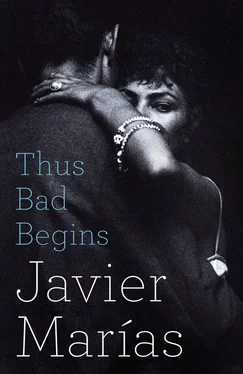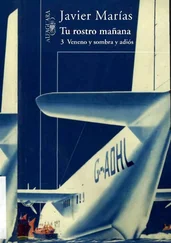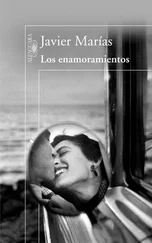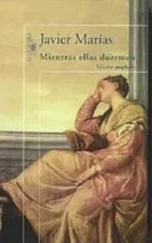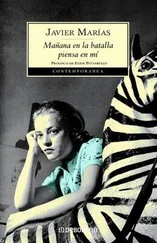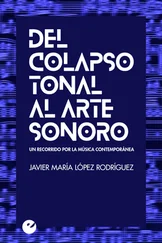After a couple of minutes, Beatriz returned — well, since she hadn’t got undressed, she wouldn’t have had much to do in the bathroom. He then went in after her, while she straightened her skirt as best she could, smoothed her hair with her fingers and picked up her handbag, as if there were no further reason to hang around and she was ready to leave without delay. I realized that this was one of those wham-bam-thank-you-ma’am situations: not much to talk about before and nothing at all afterwards. He must have shouted ‘Wait!’ from the bathroom because she put her bag down on the table again and leaned heavily on the back of a chair in a slight gesture of impatience. When he reappeared with hair combed — his usual baguette crowning his cranium — he moved very close to her and said something, almost in her ear. Beatriz, seriously and emphatically, shook her head. She certainly didn’t look like a happy lover, neither affectionate nor even content, I wondered how long they had been seeing each other like that, or if it was the first time — which is always a somewhat awkward and prickly situation, haunted by instant regret; on the theory of probabilities, I judged this to be completely impossible: it would have been an incredible coincidence that the very first time I had decided to follow Beatriz should also be the first of such encounters for her, and with Dr Van Vechten of all people, the man Muriel suspected of committing foul deeds in the past and whom he had charged me with observing. The Doctor stroked her cheek and she drew back. ‘No, no caresses,’ she might have said as she dodged the kindly gesture of that huge hand. (And at that very moment, the French equivalent of those words came into my head, as if I had read it somewhere: Non, pas de caresses .) But I heard nothing.
‘What are you doing up there, my child? You could crack your head open.’
This I did hear, a disagreeable voice coming from below, I hadn’t heard anyone talk about cracking their head open in ages, it was something only the old would say, and it was an old nun who had spoken. She was there at my feet, so to speak, at the foot of the tree, and I realized then the full absurdity of my situation and my behaviour: what was I doing crouched up there, it was hard to justify apart from saying that young people do sometimes do eccentric, inexplicable things, but that was a very poor excuse. The nun was wearing a blue habit and one of those floaty, winged headdresses or helmets or whatever they’re called, resembling an origami bird or a light sailing boat, though you don’t often see them in Spain, perhaps more in France and Italy. Anyway, my spying was at an end, and it occurred to me then that it would be best to make a swift getaway, before Beatriz said her goodbyes and came downstairs, I didn’t want to meet her in the garden or the little courtyard at the entrance, I needed to get out into the street as quickly as possible and vanish. As I made my descent, I was trying to think of a way of preventing the nun from delaying me with questions about who I was, why I had come in, and what I was doing perched on that fairly high branch. When I reached the ground, I decided to pretend to be offended, to divert attention from my entirely anomalous presence and position there:
‘Be so kind as not to address me as “my child”, Mother,’ I said in a rather blunt, pompous tone, ‘because I’m not your child, is that clear? You shouldn’t be so familiar with a complete stranger.’ How ridiculous to tell her off for calling me ‘my child’ and then address her as ‘Mother’. However, I knew this was a sure-fire way of pleasing elderly nuns (who may well be mothers superior) and softening them up, just as priests come over all sentimental when you call them ‘Father’, as they would like you to; a somewhat vain ambition in both cases.
She looked slightly put out and eyed me curiously. She had very arched eyebrows.
‘Now, now, my child,’ she said, ignoring my comment entirely. ‘There’s no need to get upset, that’s how I address all the other young people who come here, and it doesn’t seem to bother them. Come to think of it, I haven’t seen you before. But whatever were you doing up there? You could have taken a real tumble.’
I found it odd that she should speak so colloquially, it had been a long time too since I’d heard the expression ‘take a tumble’. She must be from a village originally or a small town.
I hesitated for a moment, I needed to get going. I said the first idiotic thing that came into my head:
‘I wanted to go up really high to see if Our Lady would appear to me, Our Lady of Darmstadt,’ I explained unnecessarily. ‘I know she often does appear to people.’
I had no idea if this was true or not, but I assumed it was: any Virgin with a sanctuary named after her was sure to have appeared several times suspended in mid-air or over the sea or on a rock or even at the top of a tree (which, after all, is where I had been — or almost). That’s their way of indicating where a church should be built in their honour, or so they say. And they show themselves in various places in order to get a basilica here, a shrine there, a niche over there — they’re never satisfied.
‘She doesn’t just appear like that, at the beck and call of the believer. That would be too theatrical. And if she did keep appearing, then where would we be? In a right pickle.’ I didn’t even know that last expression. It sounded very old-fashioned, although I could guess what it meant. That nun had definitely come from some hidden-away place or, possibly, the Middle Ages.
‘Ah, I see. You mean she’s shy. Well, yes, that makes sense. And if she did keep making those theatrical appearances, we would, as you say, be in a right pickle.’ I repeated her words as if this were an expression I used all the time. I glanced over at the double staircase, down which Beatriz, I assumed, would have to come on her way out. From where I was, I could see only one flight of stairs, the other remained hidden; I trusted that Beatriz would choose those stairs and would, therefore, not see me, just as I could not see them. Or that Van Vechten had detained her for a while longer. At any rate, I needed to get away as quickly as possible. ‘Well, I have to rush off now, Mother. Forgive my reaction, my ignorance, and for having startled or bothered you in any way. It was a pleasure to meet you.’
I kissed her hand as if she were a cardinal or a bishop, I had little experience of ecclesiasticals, but had observed that with some of them, you were expected to plant a kiss on the big purple ring they wore — and if that isn’t theatrical, I don’t know what is — and besides, that nun from some remote time or place deserved no less: she had been very kind, despite her grating voice. In a few strides I had reached the street door. I looked left and right, but luckily saw no one else and only hoped that neither Beatriz nor Van Vechten had come over to the window during the few minutes I had stood talking to the nun at the foot of the tree. I strode rapidly off down the street, but stopped short when I had gone barely twenty paces, because I spotted Beatriz in the distance, the sway of her skirt was unmistakable, although now it swayed with rather less ease, since it had, needless to say, become somewhat creased. She had been very quick and had clearly allowed Van Vechten neither caresses nor words ( Non, pas de mots , she might have said, had she been in a novel), she had obviously departed unnoticed while I was still talking to the old lady. She was about to go into the nearby Museo Lázaro Galdiano, on the opposite side of a broad street. This time, I did not go after her, doubting that yet another lover would be waiting for her inside.
And yet when I followed Beatriz again a few days later, during that same period when Muriel was away from Madrid, I did think there might be a second lover. On that occasion, Beatriz had again gone out for a walk and at a similar hour. She walked for a while along Calle Velázquez where she lived, or where we (in a sense) lived, for I was spending more and more time at the apartment, whether intentionally or by chance, I’m not sure; when she reached Lista — the name we madrileños gave, and still give, to what is officially Calle de Ortega y Gasset, as it appears on maps and in guides — she turned right and walked the short distance to Plaza del Marqués de Salamanca. I saw her go in through the high doorway of one of the houses in the square. I allowed a few minutes to pass before going over to read the small metal plaques — there were a few of them, mostly brass — screwed into the wall beside the door, so that they could easily be seen from the street, perhaps as a discreet advertisement for companies that had their headquarters in the building in question or for professionals with a certain prestige or reputation or for those aspiring to that and trying their luck and making their way. There were seven plaques beside that particular door: three were rather cryptic, ‘Meridianos’, ‘221B BS’ and ‘Gekoski’, but I presumed they were the names of companies. The same would be true of ‘Marius Kociejowski. Middle Eastern Travel’, but at least it told you what he did (broad, but specific; he was not, I presumed, a mere travel agent). I was struck by the fact that there were two more or less Polish surnames on the plaques, or so they seemed to me, there weren’t as many Poles in Madrid then as there would be a decade or more later, after the fall of the Iron Curtain, and the Poles who arrived then tended not to be businessmen. I knew ‘Deverne Films’, a very influential and successful film distributor, which also owned various cinemas, and, after all, who didn’t know the vast logo that regularly filled cinema screens, announcing: ‘Deverne Films presents …’? Muriel, I recall, had dealings with the family, as, no doubt, did all directors. In fact, a few months before, I had accompanied Muriel to a meeting in a café with the company’s founder and one of his sons, who although not yet thirty, was already very much part of the firm. The distributors were involved in film production, advancing initial funding so that a film could be made and, assuming they liked the finished product, reserving the distribution rights or else making money by selling it off to another distributor. The two remaining plaques were more run of the mill: ‘Juan Mollá. Lawyer’, said one, and the last was equally terse: ‘Dr Carlos Arranz. Medical Consultant’.
Читать дальше
